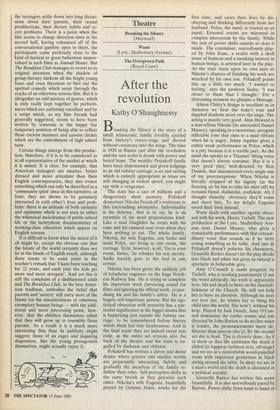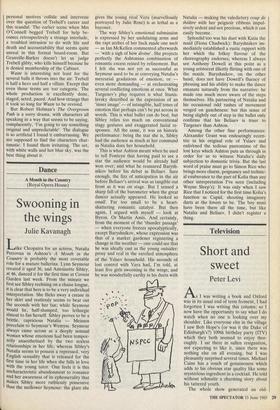Theatre
Breaking the Silence (Mermaid) Waste (Lyric, Shaftesbury Avenue) The Overgrown Path (Royal Court)
After the revolution
Kathy 0 Shaughnessy
Breaking the Silence is the story of a small aristocratic family forcibly ejected from history's centre-stage and shoved without ceremony into the wings. The time is 1920 in Russia just after the revolution and the new order is drunk with power and brutal hope. The wealthy Pesiakoff family have been dispossessed and given lodgings in an old railway carriage, a set and setting which is entirely appropriate as times are still changing at violent speed, you might say with a vengeance.
The state has a cast of millions and a dangerously short memory. Poliakoff dramatises Nikolai Pesiakoff's resistance to this encroaching anonymity. Individuality is his defence, that is to say he is an eccentric of the most preposterous kind. Like a mad Diaghilev he struts with his cane and fur-rimmed coat even when they have nothing to eat. The whole family, Nikolai, his wife Eugenia, son Sasha and maid Polya, are living in one room, the carriage. Style, however, is all. `Go to your room, Sasha,' he rebukes his son sternly. Sasha meekly goes to the bed in one corner.
Nikolai has been given the unlikely job of telephone engineer on the huge North- ern Railway line. He is trying to complete his important work (inventing sound for film) and ignoring his official work, jeopar- dising his and his family's safety. He is a hugely self-important person. But his ego- tistical obsession with posterity has a par- ticular significance in the bigger drama that is happening just outside the railway car- riage: to be remembered before history whirls them fast into facelessness. And in the final scene they are indeed swept into exile, as the entire set retreats into the back of the theatre and the train is en- gulfed by darkness and oblivion.
Poliakoff has written a clever and dense drama where greater and smaller worlds are perpetually interacting. Subtly and gradually the members of the family re- define their roles. Self-perception shifts in the same breath as they perceive each other. Nikolai's wife Eugenia, beautifully played by Gemma Jones, works for the first time, and saves their lives by dis- obeying and thinking differently from her husband. Polya, the maid, is treated as an equal. External events are mirrored in complex microcosm by the family. While the axis of power shifts outside so does it inside. The commissar, marvellously play- ed by John Kane, a realist with a droll sense of humour and a sneaking interest in human beings, is arrested later in the play. As the state turns upon its own men so Nikolai's chances of finishing his work are wrecked by his own son. Poliakoff points this up a little too much. 'I wanted to belong,' says the penitent Sasha. 'I was closer to them than I thought.' For a distressing moment we glimpse a Message.
Alison Chitty's design is excellent as in darkness we hear the train's roar and dappled shadows move over the stage. The acting is mostly very good. Alan Howard is a marvellous Nikolai (he succeeded Daniel Massey), speaking in a stentorian, arrogant inflexible tone that rises to a mad vibrato when he is angry. Jenny Agutter gives a rather weak performance as Polya, which is a pity because it is a terrific part. As the maid she speaks in a `Daarsee lilting voice that doesn't always convince. But it is a very good play, well-directed by Ron Daniels, that disconcerted every single one of my preconceptions. When Nikolai is literally stripped of his dignity (in the freezing air he has to take his shirt off) he remains bland, disdainful, confident. Ah, I thought dismally, obviously they'll come and shoot him. To my delight Eugenia saved their lives instead.
Waste deals with another egotist obses- sed with his work, Henry Trebel!. The new production at the Lyric, Shaftesbury Ave- nue stars Daniel Massey, who gives a remarkable performance with that extraor- dinary voice that sounds as if he were eating something as he talks. And just as Poliakoff doesn't polarise his characters,, Granville Barker doesn't let the play divide into black and white but gives us instead a spectacle in believable grey.
Amy O'Connell is made pregnant by Trebell, who is working passionately (I usc the word advisedly: his work is apparently love, life and death to him) on the disestab- lishment of the Church. He will not help her to have an abortion. Although he does not love her, he wishes her to bring his child into the world. She won't, without his help. Played by Judi Dench, Amy O'Con- nell dominates the earlier scenes and was directed by John Barton to do so (her voice is louder, the pronouncements more de- liberate than anyone else's). By the second act she is dead. This is cleverly done. As if to show us that life continues the death is elided (it happens between acts, off-stage) and we are in a comfortable wood-panelled room with important gentlemen in black sitting around the table. In short we are in a man's world and the death is discussed as a political scandal.
Granville Barker has written this scene beautifully. It is also marvellously paced by Barton. Power shifts from hand to hand as
personal motives collide and intervene over the question of Trebell's career and this scandal. The earlier scene when Mrs O'Connell begged Trebell for help be- comes retrospectively a strange interlude, a troubled intrusion to do with life and death and accountability that seems quite unreal in this formal board-room. But Granville-Barker doesn't let us judge Trebell glibly, who kills himself because he is denied membership of the Cabinet.
Waste is interesting not least for the several balls it throws into the air. Trebell is half a hero and half a villain. Except that even those terms are too categoric. The whole production is excellently done, staged, acted, paced. And how strange that it took so long for Waste to be revived.
But Robert Holman's The Overgrown Path is a sorry drama, with characters all speaking in a way that seems to be saying, complacently, 'I'm going to say something original and unpredictable'. The dialogue is so artificial I found it embarrassing. We are supposed to find the characters char- ismatic. I found them irritating. The set, with white walls and hot blue sky, was the best thing about it.



















































 Previous page
Previous page